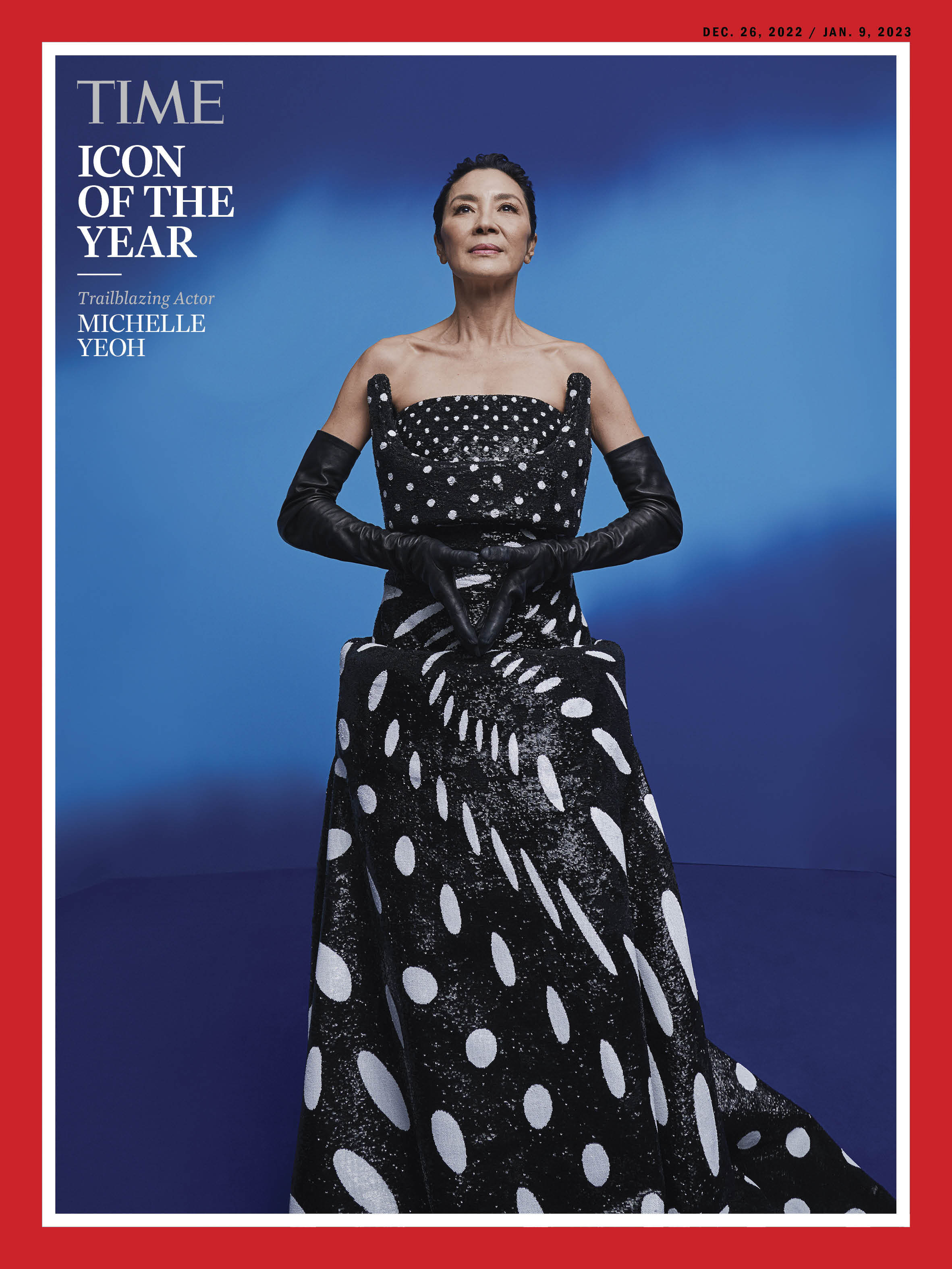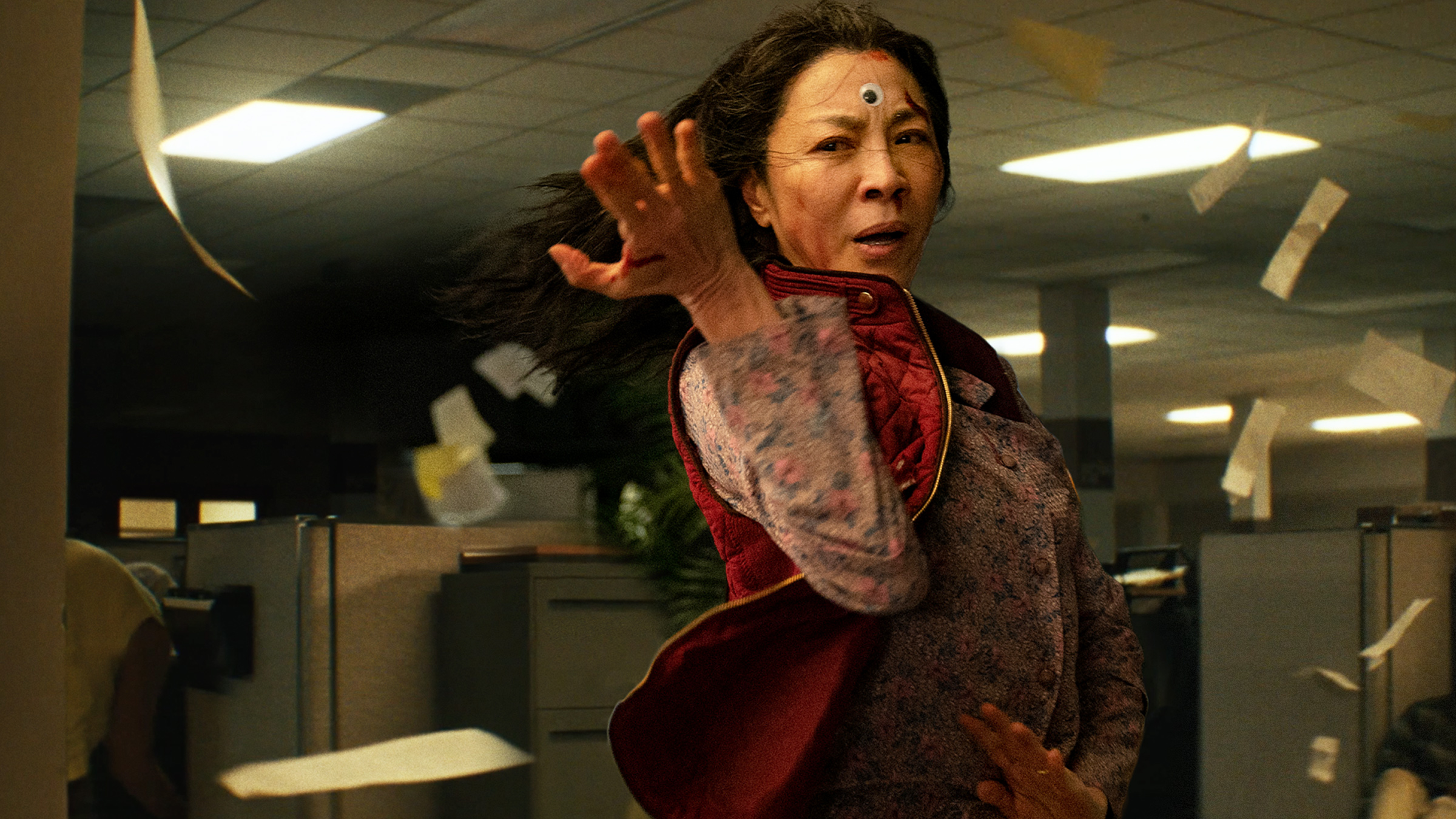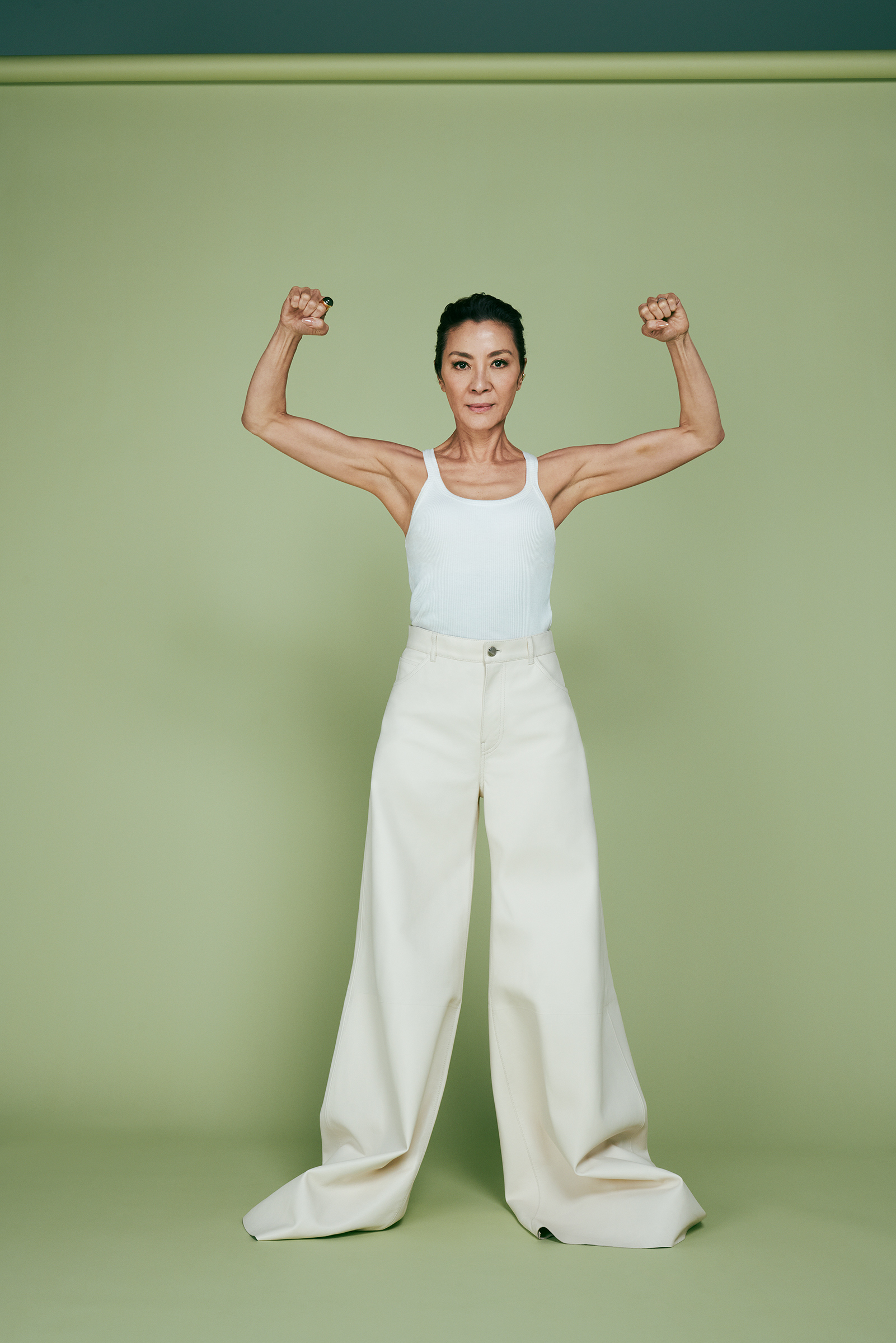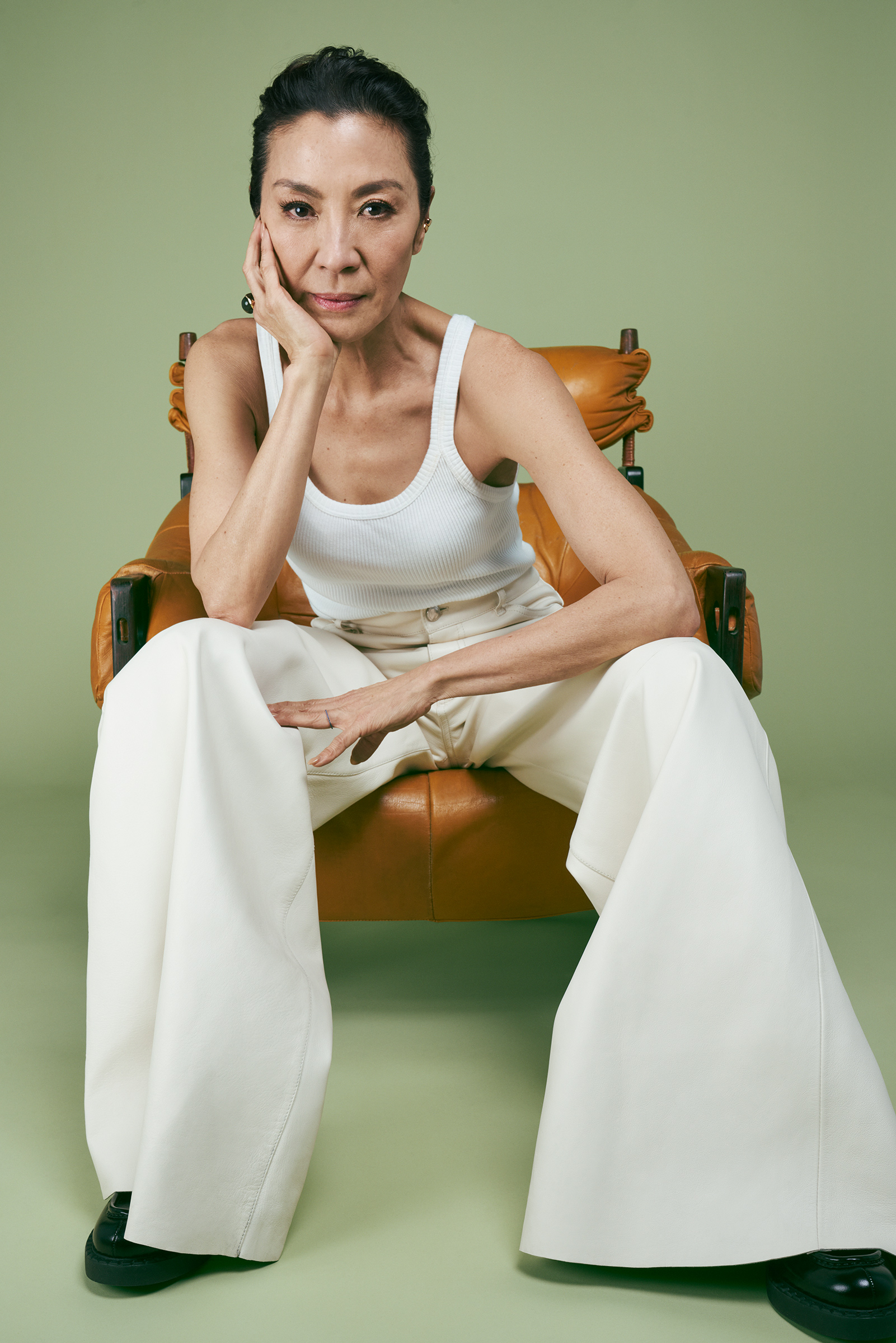Cast your eyes to the floor and you’ll notice: though there are dozens of people here, engaged in as many conversations over afternoon cocktails, virtually all the shoes in the room are angled toward Michelle Yeoh.
It’s mid-November in Los Angeles, which means the city is gearing up for Oscars season, and Yeoh is holding court before an industry screening of her film Everything Everywhere All at Once. Everyone here wants to meet her, to shake her hand, to be remembered by her. Dressed in staggering platform sneakers and an embellished blazer, she’s posing for photos, cracking jokes, throwing her head back to laugh, sipping from a glass of wine—embodying the role of the star—until fellow actor Ke Huy Quan approaches, and she softens. She places a hand on his cheek, brushes something from his shirt. The two played husband and wife in the surreal, action-packed family love story, and through their connection, Yeoh’s warmth becomes visible in the chaos.

“They call it a campaign,” she says later, exhaling in the silence of a private dining room. She’s played her part, and now she can eat. “It’s a little overwhelming.”
The fact that all this is new to Yeoh is remarkable. Since making her debut in Hong Kong action films in the mid-’80s, the now 60-year-old Malaysian actor has battled Jet Li in The Mummy: Tomb of the Dragon Emperor, flung herself onto a moving car driven by Jackie Chan in Supercop, and jumped off a skyscraper with Pierce Brosnan’s James Bond in Tomorrow Never Dies. She had major roles in Crouching Tiger, Hidden Dragon; Memoirs of a Geisha; and Crazy Rich Asians. She’s done Marvel, Star Trek, Kung Fu Panda, Minions—Avatar, Transformers, and The Witcher are next. But, until Everything Everywhere All at Once, which premiered in March, she had never been No. 1 on a Hollywood call sheet.
Buy a print of TIME’s Icon of the Year cover, featuring Michelle Yeoh
She’s clear about why: Asian actors have long been given stereotypical or inconsequential roles, and rarely top billing. “It shouldn’t be about my race, but it has been a battle,” she says, golden baubles on her jacket clanging as she mimics elbowing her way through a crowd. “At least let me try.”
Which is why the role of Evelyn Wang in Everything Everywhere All at Once was such a revelation. In the hit art-house film directed by Daniel Kwan and Daniel Scheinert (known as Daniels), Yeoh is an overworked, over-burdened immigrant wife and mother facing an IRS audit of the family laundromat when, suddenly, everything changes. She learns that there are multiple versions of the universe, and they’re all facing a threat that only she can stop—if she can figure out how to jump between different realities and pick up skills possessed by different versions of herself. Yeoh has the opportunity to showcase all of her talents—as a martial artist but also, in portraying Evelyn’s deep love for her family, even as she struggles to communicate with them, her abilities as a dramatic actor. It’s a shift for the actor, who toggles between wacky sequences, like a world where humans have hot dogs for fingers, and intimate moments. “She usually plays masters, tough fighters,” says Jet Li. “The action—I know she can do it. But really acting from the heart, believing the part, makes the movie very special.”

This is the moment Yeoh has long been waiting for: a big, starring role, the kind that could make her a household name. She likes to tell the story of how, during a recent press tour, she kept hearing from young journalists that their parents were excited for them to interview her. Her point is that she wants young people themselves to think she’s cool and relevant. I know this means I probably shouldn’t bring up my parents, but there’s a problem: my mom, who I’ve heard refer to Yeoh as her “hero,” is currently hiding in my company-provided hotel room. She doesn’t live in Los Angeles—she flew here, ostensibly to spend time with me, but we both know the truth. She wants to meet Michelle Yeoh.
Yeoh was not meant to be a movie star. Growing up in Ipoh, Malaysia, she imagined a future in ballet. But a back injury at the Royal Academy of Dance in London cut her dancing ambitions short, and in 1983 her mother entered her in the Miss Malaysia pageant—which she won—and soon she was filming a wristwatch commercial with Jackie Chan. The production company for the ad also made movies, and she quickly found her way into the industry.
Yeoh has been a major star in Asia for decades—she was a giant in the golden age of Hong Kong action cinema, top-lining dozens of films and earning a reputation for nailing daring stunts. She nearly quit acting more than once—first because she got married and planned to have children (a path she learned wasn’t possible for her), and later because of injuries she suffered on set. In 1995, Yeoh was recovering from a stunt gone wrong when Quentin Tarantino, in Hong Kong to promote Pulp Fiction, stopped by to pay homage. As he recited her fight sequences, frame by frame, Yeoh decided she wasn’t done. Soon, she landed her first major Hollywood role: Wai Lin, the Chinese secret agent in Tomorrow Never Dies who, in what was then a departure for the franchise, was every bit James Bond’s equal.

Around that time was when Yeoh realized that there was a fast way to gain a foothold in the U.S., and there was a right way. People she met could not distinguish Malaysia from China or Japan, and were overly complimentary of her English. After Bond, the offers came in—but they were for the only kind of roles the industry could imagine for someone who looked like her. Yeoh turned down everything that perpetuated harmful tropes about Asian women, and it was three years before she made another Hollywood film.
That project was the 2000 martial-arts fantasy Crouching Tiger, Hidden Dragon. Director Ang Lee thought of her first for the role of the warrior Yu Shu Lien, who grounds the movie. “I would hope, selfishly, that it was the peak for her,” Lee says, adding that she made him cry on set. “But she just went on making good performances, year after year.”
Another high point was 2018’s Crazy Rich Asians, in which Yeoh played a tough yet loving mother who disapproves of her son’s relationship. For Kevin Kwan, the author of the book and an executive producer on the film, her performance exposed a dichotomy: audience members in Asia expected nothing less from a familiar star, while Americans treated her like a new discovery. There was a push to launch an Oscar campaign for her, but it didn’t take off. “Hopefully, that planted a seed,” Kwan says. “And you keep building.”
Yeoh is carrying an added weight in this year’s Academy Awards race: the understanding that victory for her would be received by Asians everywhere as victory for them too. No Asian woman has won Best Actress. “I’ve thought about it,” she admits. “And not just me—I feel like my full Asian community has thought about it. They come up to me and they say, ‘You’re doing it for us.’”
Yeoh is suddenly finding herself, after all these years, in the conversation with many women, white women in particular, who are considered to be the very best at their craft. “I do look at all my peers—Cate Blanchett, Olivia Colman, Helen Mirren—and go, Oh God, I envy all the different opportunities you get to showcase your talent again and again,” Yeoh says. She put everything she had into playing Evelyn Wang. “When you get an opportunity like this, you have to pour your heart and soul into it, because you don’t know when the next chance is,” she says. “I think that is my biggest fear: Please don’t let this be the one and only.”
It’s hard to put into words what representation means to people who so rarely enjoy it—how it feels to see, for the first time, a person onscreen who looks like you or someone you love saving the world. I’m trying to find the right way to ask Yeoh what this means to her when I realize I need to tell her the truth: I’ve stashed my mother nearby, and she’s dying for an introduction. I’m not at all surprised when Yeoh insists I bring Mom to the photo shoot the next morning.
In the car on the way to the studio, I offer my mother a warning: this is a top-secret operation, and she cannot take photos. Inevitably, the moment we arrive and she takes in the scene—the crew, the equipment, and the Michelle Yeoh, radiant in front of long, lighted mirrors—Mom’s phone is out of her pocket. But Yeoh greets us both with such warmth and recognition that in that moment we are not journalist and guest—we are daughter and mother, greeting an icon who represents us in a way that feels deeply personal.
For hours, I watch my mom watch Yeoh. She has her arms stretched outward in a glittering gown, she’s dancing. Everyone is rapt. And she reminds me of my mom—they are of the same generation, after all, and they are both dynamic and fierce and wonderful in ways that feel related, at least to me. To see my mom witness Yeoh at work is to understand what she means to so many people around the world.

If life is a series of decisions that set you on your own path, Yeoh has made some good ones. Starring in a film about confronting multiple realities has meant she’s been answering questions about alternate versions of her own life all year—what if she’d never injured her back as a teen ballerina? What if she’d had children and remained retired? What if Tarantino had never visited her? Her answer is always the same: There’s no point in wondering what if. Her life has gone the way it has gone, and there’s only forward from here.
What happens next, at least for this film, is out of her hands. But that doesn’t stop her from reaching one across the table, palm open toward me.
“OK,” she says, meeting my eyes with a disarming combination of jest and sincerity. “Give it to me.” Yeoh has always been a woman who knows what she wants: to prove herself, to lend voice to fully embodied, fascinating characters, to play and to love and to reach generations through the magic of movies. Now she wants that Oscar—that validation for herself and for people around the world who look like her, like us, so we can experience what it feels like to be told we belong. “It’s not about needing it,” she says. “It’s that feeling that you don’t have to explain: it’s love from other people. My arms are out open.” —With reporting by Mariah Espada
Set Design by Rian Calhoun; Styling by Jordan Johnson; Hair by Bertrand W Delacourt; Make-up by Sabrina Bedrani